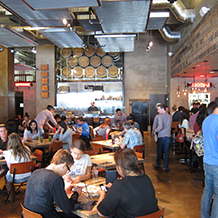Settling a Kashruth Dispute on Cedar Lane in a Menschlik Way
 After several weeks of dissension, the issue of Ima’s kosher restaurant on Cedar Lane in Teaneck may finally be settling down. All it will take is a meeting between the rabbis of the Rabbinical Council of Bergen County on one hand and the Brooklyn-based OK laboratories on the other. The meeting is scheduled for mid-December at the Englewood office of The Jewish Voice and Opinion.
After several weeks of dissension, the issue of Ima’s kosher restaurant on Cedar Lane in Teaneck may finally be settling down. All it will take is a meeting between the rabbis of the Rabbinical Council of Bergen County on one hand and the Brooklyn-based OK laboratories on the other. The meeting is scheduled for mid-December at the Englewood office of The Jewish Voice and Opinion.
At issue is who determines whether a restaurant is sufficiently kosher for the community to patronize it. Should it be the local non-profit vaad comprised of resident, often beloved rabbis in the community; or, rather, a large, well-known, and internationally respected kashruth agency. Who makes the decision whether the owner of the restaurant is sufficiently reliable?
Caught in the middle of the dispute is Ofira Zaken, who last spring opened the Teaneck daughter-branch of Ima’s, an extremely popular Jerusalem-based Middle Eastern meat restaurant run by her mother.
Opening the Store
There are some facts with which no one involved in the story disagrees. When Mrs. Zaken, who resides in Fair Lawn, opened Ima’s, she applied for and received supervision from the RCBC. For a variety of reasons, she was told she must have a mashgiach tmidi, a full-time kashruth supervisor, and she agreed.
The trouble started a few weeks later when Mrs. Zaken and the mashgiach, provided by the RCBC, had a falling out. There are some indications that the mashgiach’s salary of $15 per hour was the problem, but there also may have been other difficulties that caused Mrs. Zaken to decide no longer to employ him.
At this point, the story gets sticky. Mrs. Zaken says she was under the impression that she could find another mashgiach who was acceptable to the RCBC, pay for his training, and then take him on at a mutually agreeable salary. The RCBC says they had never made such an agreement and that Mrs. Zaken was required to keep the original mashgiach they had selected for her.
Uniform Standards
Like many other hashgacha agencies, the RCBC insists that the mashgiach not be an employee of the food establishment. Further, all RCBC mashgichim standards, salaries, and job descriptions are uniform.
For this reason, despite requests by some owners, an RCBC mashgiach is not allowed to serve as a cashier or as part of the clean-up crew.
“A mashgiach always works for the agency,” said Rabbi Steven Pruzansky, a past-president of the RCBC and the spiritual leader of Congregation Bnai Yeshurun in Teaneck.
Relinquishing or Withdrawing?
At a rather contentious meeting the next day, the rabbis threw down the gauntlet. Mrs. Zaken was told that she would have to stay with her original mashgiach if she wanted to remain under the supervision of the RCBC. Asked if she accepted those terms, she said she did not know, which, to Mrs. Zaken, meant that she was relinquishing the RCBC’s hechsher.
Almost immediately, she sought and received a hechsher from a Brooklyn-based rabbi who seems to have worked on his own. The RCBC issued its usual notice to the community that Ima’s was “no longer under the supervision of the RCBC.”
Although it is hard to tell exactly how successful her business was, by the end of the summer, Mrs. Zaken wanted to come back to the RCBC. She sent them a letter, asking if she could reapply for a hechsher and was turned down. The local vaad said they were not interested in providing her with supervision.
Rabbinic Advice
Upset, she approached her own rabbi, Rabbi Berel Zaltzman of Bris Avrohom, a Chabad shul in Fair Lawn, and asked for advice. Rabbi Zaltzman suggested she contact Rabbi Don Yoel Levy at the OK.
This, too, was complicated. According to Rabbi Levy, as a rule, the OK will not go into a community for kashruth purposes if there is a local vaad that gives hechsherim. The agency makes an exception when it is invited into a community by a local rabbi. In the case of Ima’s, the OK was invited by Rabbi Zaltzman.
The OK’s next step was to contact the RCBC. Rabbi Levy explained that whenever the OK takes over supervision of a store or restaurant, he tries to arrange a meeting with the previous kosher supervisor.
Conference Call
The busy schedules maintained by the OK rabbis and the members of the RCBC permitted only a phone call, during which the RCBC claimed that they had withdrawn Mrs. Zaken’s hechsher for “cause.”
Mrs. Zaken then produced a tape recording of her meeting with the RCBC representatives which she had made surreptitiously when they came to her restaurant after she had fired their mashgiach. The tape, in which all the parties spoke in Hebrew. showed that it was indeed she who had given up the hechsher.
The RCBC implied to Rabbi Levy that there might have been other meetings between Mrs. Zaken and the rabbis of the vaad after the taped one, but, on the tape, it is clearly Mrs. Zaken who relinquishes the hechsher.
Convinced she was telling the truth, the OK gave Ima’s their hechsher.





